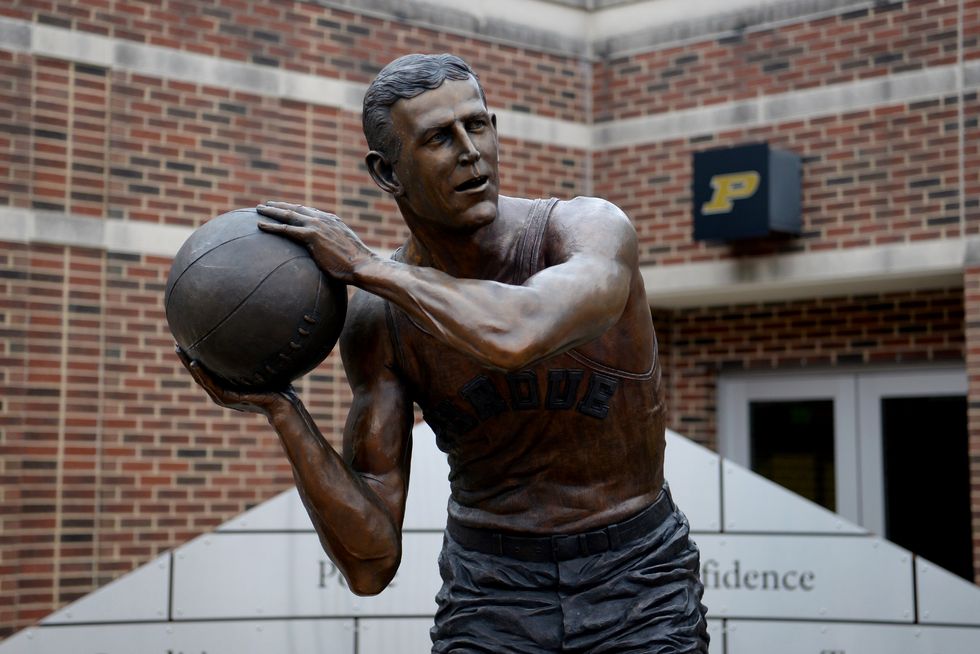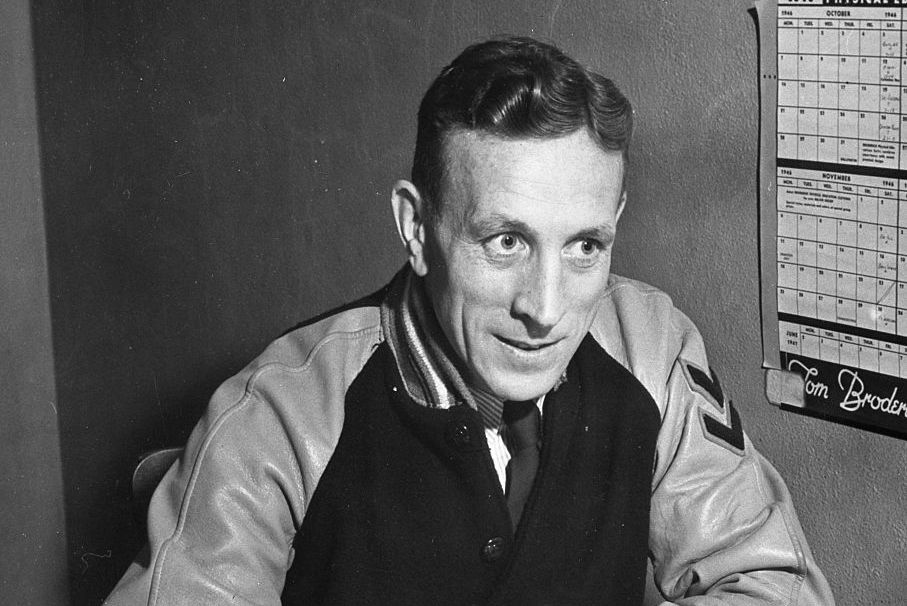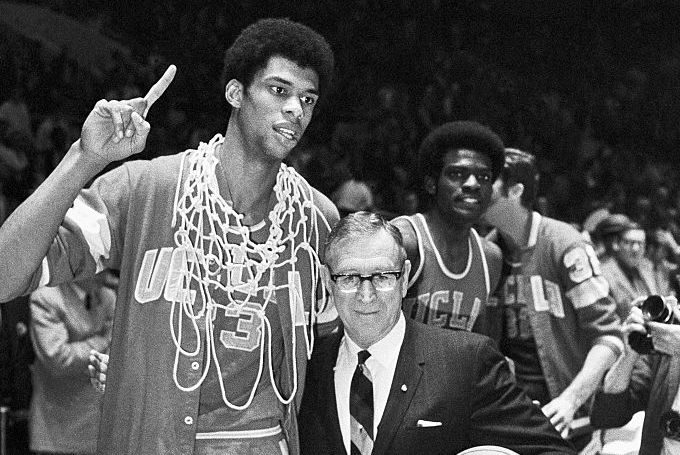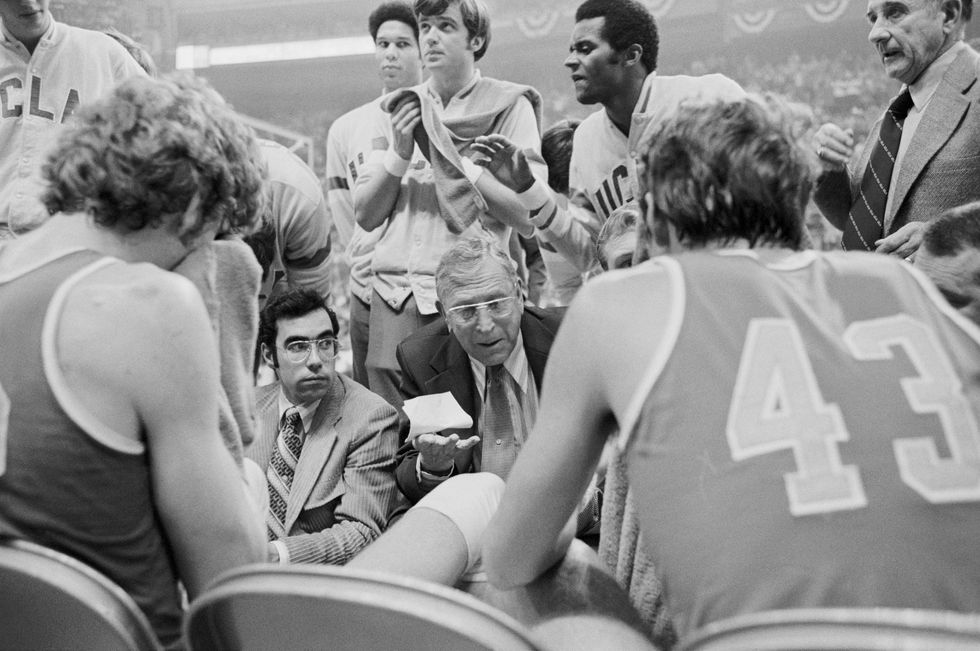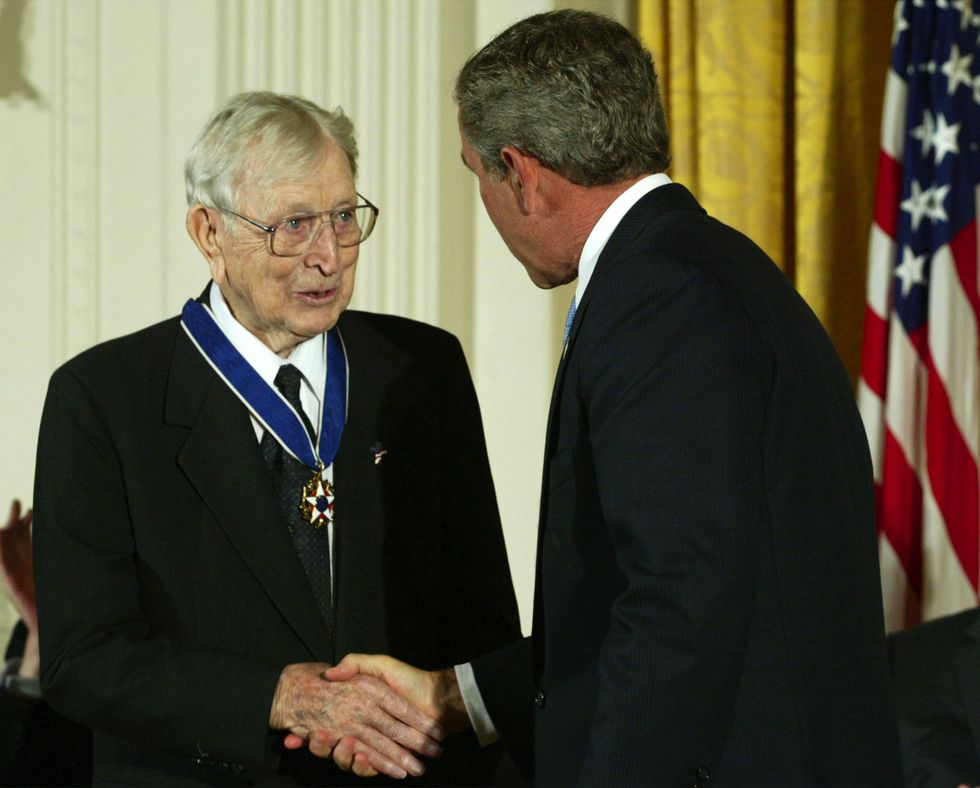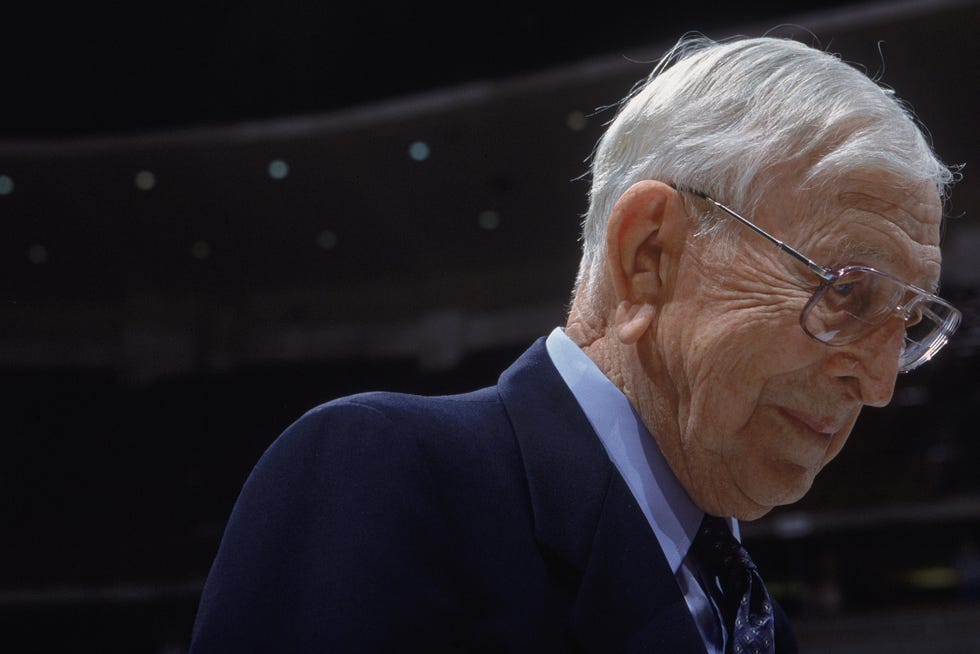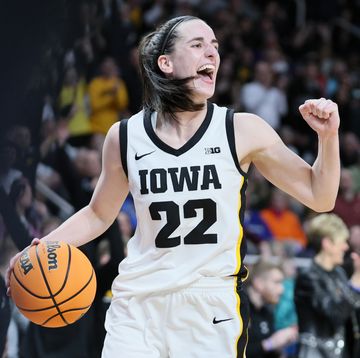1910–2010
Who Was John Wooden?
John Wooden was an All-American guard at Purdue University. After stints as a high school coach and teacher, he took over as head basketball coach at University of California, Los Angeles in 1948 and led the Bruins to a record 10 national championships. The first person to be inducted to the Basketball Hall of Fame as a player and coach, Wooden died in Los Angeles on June 4, 2010.
Quick Facts
FULL NAME: John Robert Wooden
BORN: October 14, 1910
DIED: June 4, 2010
BIRTHPLACE: Hall, Indiana
SPOUSE: Nellie “Nell” Riley (1932–1985)
CHILDREN: James and Nancy
ASTROLOGICAL SIGN: Libra
Early Life and College Career
Basketball coach John Robert Wooden was born on October 14, 1910, in Martinsville, Indiana. He was one of six children born to parents Hugh and Roxie Wooden. His upbringing on a farm in Centerton with no electricity and little money instilled a strong work ethic, but Wooden also found time for fun by playing basketball in a barn with his three brothers.
After graduating eighth grade, Wooden received a piece of paper from his father with a seven-point creed that Wooden followed the rest of his life: “Be true to yourself. Make each day your masterpiece. Help others. Drink deeply from good books, especially the Bible. Make friendship a fine art. Build a shelter against a rainy day. Pray for guidance, and count and give thanks for your blessings every day.”
In 1925, Wooden and his family moved back to Martinsville, where he met the love of his life, Nellie Riley. He also became a star basketball player at Martinsville High School, leading the team to the Indiana state championship in 1927. Wooden played as a guard at Purdue University and was named team captain as a junior, becoming the first player ever to be selected as a three-time consensus All-American selection. He was nicknamed the “Indiana Rubber Man” for his headlong style of play.
In 1932, Wooden graduated with honors and a degree in English after winning the College Basketball Player of the Year Award and receiving the Big Ten Medal of Honor, which recognizes a student from each Big Ten member school’s graduating class for their athletic and academic accomplishments. Additionally, in the pre-NCAA tournament era, the Helms Athletic Foundation retroactively named Purdue the national champions for that year.
Early Teaching and Coaching Career
Wooden was offered $5,000 to join a barnstorming tour with the New York Celtics after graduating but instead married Riley and settled in as an English teacher and coach of multiple athletic teams at Dayton High School in Kentucky. In his first year, the basketball team went 6-11; it would be the only losing season of his coaching career.
In 1934, Wooden returned to Indiana to teach English and coach basketball, baseball, and tennis at South Bend Central High School. During this time, he formulated the principles of his seminal “Pyramid of Success” teaching model, aiming to inspire his students and teams to derive the most from their potential, that was based on his father’s advice. During two years at Dayton and nine years at Central, his high school basketball coaching record was 218-42.
After serving as a Navy lieutenant during World War II, Wooden became the athletic director, as well as the coach for the basketball and baseball teams, at Indiana State Teachers College in 1946. His basketball teams won back-to-back Indiana Collegiate Conference titles and notched an impressive 44-15 record over two seasons.
In 1947, Wooden’s team was invited to the National Association of Intercollegiate Basketball National Tournament, but he rejected the invitation due to the NAIB’s ban of Black players. The ban was lifted the next year, and Wooden’s team played in the tournament, losing to Louisville in the final.
Starting at UCLA
Wooden took over as basketball coach for UCLA in 1948. Around the same time, the University of Minnesota had pursued him for a head coaching job. Wooden and his wife wished to stay in the Midwest, but due to a miscommunication, Wooden believed he was no longer being offered the position. The University of Minnesota ultimately did offer him the job, but Wooden had already accepted the position with the UCLA Bruins and didn’t want to break his pledge to them.
The UCLA position was hardly a sought-after post given that the team lacked a proper playing arena and facilities. The basketball program had only two conference championship seasons in nearly two decades. Wooden instilled some much-needed discipline into his players, forbidding them from cursing and criticizing each other.
His efforts bore fruit: UCLA went 22-7 in Wooden’s first season in 1948-49 and went 24-7 the next season, marking Wooden’s first NCAA Tournament and UCLA’s first conference title since 1927. UCLA won three Pacific Coast Conference titles in his first eight seasons. During the 1955-56 season, the Bruins earned their first undefeated PCC conference title and won 17 straight games.
Continued Success at UCLA
In 1960, Wooden was inducted into the Naismith Memorial Basketball Hall of Fame as a player, but his impact on the game was far from finished. The Bruins reached their first Final Four in an NCAA tournament during the 1961-62 season, losing by two points to eventual champion Cincinnati, in part due to a controversial last-minute charging call.
Wooden led UCLA to a perfect 30-0 record and the school’s first national basketball championship in 1963-64 after defeating Duke 90-83 in the final game. Wooden, who earned Coach of the Year honors, brought home a second championship the following season, besting Michigan 91-80 in the championship game. UCLA failed to make the NCAA tournament during the 1965-66 season after finishing second to Oregon State in the Athletic Association of Western Universities.
Beginning in the 1966-67 season, the Bruins embarked on the most dominant run in college basketball history, winning the championship every season except for one until Wooden’s retirement. They won seven straight championships with Lew Alcindor—later known as Kareem Abdul-Jabbar—and then Bill Walton anchoring the center position, gaining three undefeated seasons along the way.
Wooden coached the Bruins during the “Game of the Century” on January 20, 1968. It was the first NCAA regular season game broadcast nationally on prime-time television, helping establish college football as a viable TV commodity. The Bruins lost 71-69 in an upset to the Houston Cougars, and the game proved controversial when Wooden benched Edgar Lacy for 11 minutes and did not return him to the game. Wooden’s public remarks about the player after the game prompted Lacy to angrily quit the team.
Final Seasons
Wooden was inducted to the Basketball Hall of Fame again in 1973 for his remarkable coaching accomplishments, making him the first person to be honored as a player and coach. UCLA went 30-0 during the 1972-73 season, extending their winning stream to 75 consecutive games. The streak ended the next season at an NCAA men’s basketball record-high 88 games, when Notre Dame beat the Bruins 71-70. That same season, North Carolina ended UCLA’s streak of consecutive championships, beating the Bruins 80-77 in double overtime during the semifinals.
The team rebounded the following year to give Wooden one more title before his retirement. Wodoen ended his 29-year college head coaching career with a 664-162 combined record for an amazing .804 winning percentage, as well a record 10 national championships. He became known as the “Wizard of Westwood,” a nickname he personally disliked.
Post Coaching Career and Legacy
Wooden remained an influential figure on the sidelines of the game following his retirement. The John R. Wooden Award, given annually the the most outstanding men’s and women’s college basketball players, was named in his honor in 1977. Likewise, the MVP award for the McDonald’s All-American Game for high school basketball is called the John R. Wooden Most Valuable Player Award.
He received the Reagan Distinguished American Award in 1995 and the Presidential Medal of Freedom in 2003. Wooden was also named to the founding class of the National Collegiate Basketball Hall of Fame in 2006, along with James Naismith, Oscar Robertson, Bill Russell, and Dean Smith.
Personal Life and Death
Wooden was a devout Christian and repeatedly stressed that his religious beliefs were more important to him than basketball. Wooden lost Riley, his wife of 52 years, to cancer in 1985. He remained devoted to her long after her death, writing her love letters on the anniversary of her death each year.
In 2001, Wooden co-wrote the bestselling book Be Quick—But Don’t Hurry! Finding Success in the Teachings of a Lifetime. He also co-wrote multiple books with Steve Jamison after turning 90.
Wooden was admitted to the Ronald Reagan UCLA Medical Center in Los Angeles on May 26, 2010, and died of natural causes on June 4, four months shy of his 100th birthday. He was survived by his two children, seven grandchildren, and thousands of former players, coaches, and friends who took the great teacher’s life lessons to heart.
Kareem Abdul-Jabbar, who had long kept in touch with his former coach throughout Wooden’s life, published a book about their friendship in 2017 called Coach Wooden and Me.
Quotes
- All of life is peaks and valleys. Don’t let the peaks get too high and the valleys too low.
- Things turn out best for the people who make the best of the way things turn out.
- Make each day your masterpiece.
- Do not let what you cannot do interfere with what you can do.
Citation Information
- Article Title: John Wooden Biography
- Author: Biography.com Editors
- Website Name: The Biography.com website
- URL: https://www.biography.com/athletes/john-wooden
- Access Date:
- Publisher: A&E; Television Networks
- Last Updated: March 14, 2023
Fact Check: We strive for accuracy and fairness. If you see something that doesn’t look right, contact us!..
The Biography.com staff is a team of people-obsessed and news-hungry editors with decades of collective experience. We have worked as daily newspaper reporters, major national magazine editors, and as editors-in-chief of regional media publications. Among our ranks are book authors and award-winning journalists. Our staff also works with freelance writers, researchers, and other contributors to produce the smart, compelling profiles and articles you see on our site. To meet the team, visit our About Us page: https://www.biography.com/about/a43602329/about-us
Colin McEvoy joined the Biography.com staff in 2023, and before that had spent 16 years as a journalist, writer, and communications professional. He is the author of two true crime books: Love Me or Else and Fatal Jealousy. He is also an avid film buff, reader, and lover of great stories.

